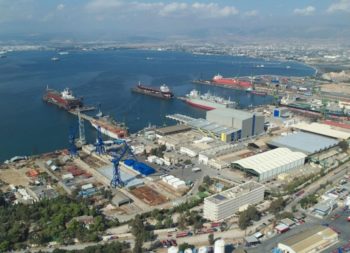The question of who actually owns Greece’s largest shipyard has come into question as the Athens government revives efforts, going on for some three years, to find investors interested in rejuvenating the country’s shipbuilding sector.
The government’s battle with the European Competition Commission over the alleged payment for some $275m in state subsidies to the Skaramanga-based Hellenic Shipyards (HSY) is a well-known stumbling block for potential investors. Brussels says the yard must return the subsidies, which could run to double this amount when interest is taken into account.
Indeed, China’s Cosco Shipping, already heavily involved in the development of Piraeus and its environs, is known to be unwilling to become engaged in EU/state issues.
Another stumbling block to the sale of shipyard assets is the fact the government is also embroiled in litigation with Lebanese businessman, Iskandar Safa, co-owner the Privinvest Group which took control of HSY in late 2010.
Last June, Safa submitted a request for arbitration against Greece at the World Bank’s International Centre for Settlement of Investment Disputes (ICSID). Prior to this, Privinvest and HSY had been asserting their rights against Greece under the Bilateral Investment Treaty between Lebanon and Greece, by way of arbitration at the International Chamber of Commerce (ICC). Greece has also launched its own ICC arbitration action against Privinvest and HSY.
When turning to the ICSID, Safa maintained Privinvest invested in HSY because it believed in the future of the shipyard. He “wanted to build on the shipbuilding tradition of Greece, its existing relationship with the Greek Navy and on HSY’s skilled and experienced workforce for the benefit of its wide international customer base”. He said: “All of the ingredients needed to turn around the struggling shipyard and to make Privinvest’s investment a success for my group and Greece were there.”
As part of Privinvest’s agreement on taking over the yard, claims faced by Greece filed by HSY’s former owner were dropped, and the Greek Navy took possession of the one completed submarine and four substantially completed submarines contracted to be built at the yard and for which it had paid $2.4bn but did not own.
Safa says soon after Privinvest’s investment, HSY received a claim for more than EUR300m ($360m) from the Greek railways – a government owned entity controlled by the Finance ministry – for breaches allegedly occurring many years before the investment.
The Greek government then announced HSY could not work for foreign navies, under an EU ruling in December 2010. This was followed by the government stopping payment under the parliamentary ratified contracts for its submarine programmes and the curtailment of the additional work promised by the government, which was necessary to maintain full employment at the yard.
Safa said: “Hellenic operated, despite these issues, with all of its employees being fully paid, for more than a year, Privinvest and HSY trying at all times to find a solution to restore the agreed investment parameters. Despite a number of promises being made at all levels of the government, no solution was found and HSY and Privinvest were left with no option but to initiate arbitration pursuant to the terms of the relevant agreements.”
Source: Seatrade Maritime.
